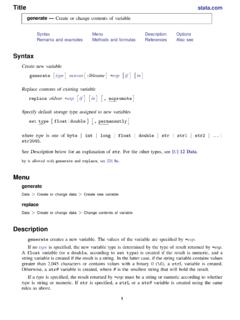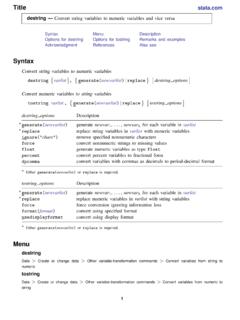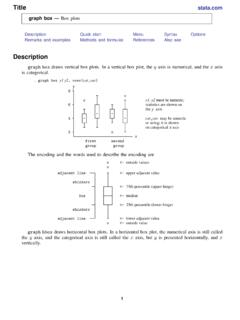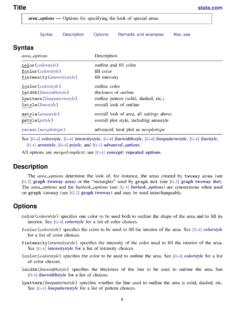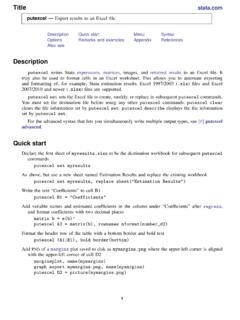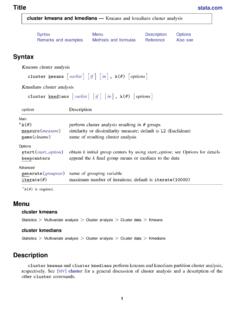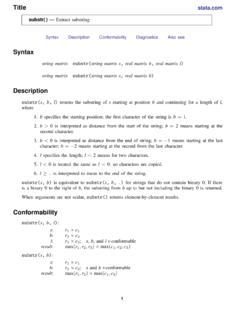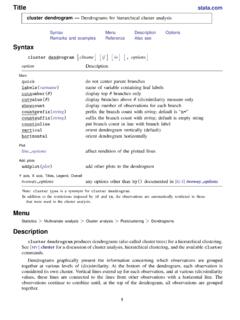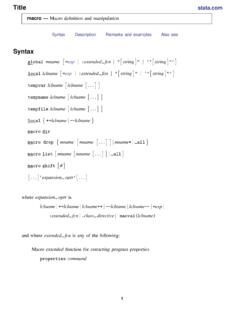Transcription of Title stata.com gettoken — Low-level parsing
1 Low-level parsingSyntaxDescriptionOptionsRemarks and examplesAlso seeSyntaxgettokenemname1[emname2]:emname 3[, parse("pchars") quotesqed(lmacname) match(lmacname) bind]wherepcharsare the parsing characters,lmacnameis a local macro name, andemnameis describedin the following to macro(local)macronamelocal macro(global)macronameglobal macroDescriptiongettokenis a Low-level parsing command designed for programmers who wish to parse input forthemselves. Thesyntaxcommand (see [P]syntax) is an easier-to-use, high-level parsing the next token from the macroemname3and stores it in the macroemname2is specified, the rest of the string fromemname3is stored in , oremname2andemname3, may be the same name. The first token isdetermined based on the parsing characterspchars, which default to a space if not ("pchars")specifies the parsing characters.
2 Ifparse()is not specified,parse(" ")isassumed, meaning that tokens are identified by that the outside quotes are not to be stripped in what is stored inemname1. Thisoption has no effect on what is stored inemname2because it always retains outside a rarely specified option; usually you want the quotes stripped. You would not want the quotesstripped if you wanted to make a perfect copy of the contents of the original macro for parsingat a later (lmacname)specifies a local macroname that is to be filled in with 1 or 0 according to whetherthe returned token was enclosed in quotes in the original ()does not change howparsing is done; it merely returns more (lmacname)specifies that parentheses be matched in determining the token.
3 The outer level ofparentheses, if any, are removed before the token is stored inemname1. The local macrolmacnameis set to ( if parentheses were found; otherwise, it is set to an empty that expressions within parentheses and those within brackets are to be bound together,even when not parsing on()and[].12 gettoken Low-level parsingRemarks and we applygettokento the macro 0 (see[U] parsing nonstandard syntax), as ingettoken first : 0which obtains the first token (with spaces as token delimiters) from 0 and leaves 0 , alternatively, gettoken first 0 : 0which obtains the first token from 0 and saves the rest back in 0 .Example 1 Even thoughgettokenis typically used as a programming command, we demonstrate its useinteractively.)
4 Local str "cat+dog mouse++horse". gettoken left : str. display " left " cat+dog. display " str " cat+dog mouse++horse. gettoken left str : str, parse(" +"). display " left " cat. display " str " +dog mouse++horse. gettoken next str : str, parse(" +"). display " next " +. display " str " dog mouse++horseBoth global and local variables may be used withgettoken. Strings with nested quotes are alsoallowed, and thequotesoption may be specified if desired. For more information on compounddouble quotes, see[U] Double global weird " ""some" strings" are "within "strings"" " . gettoken (local)left (global)right : (global)weird. display " left " "some" strings. display "$right" are "within "strings"".
5 gettoken left (global)right : (global)weird , quotes. display " left " ""some" strings" . display "$right" are "within "strings"" Thematch()option is illustrated Low-level parsing 3. local pstr "(a (b c)) ((d e f) g h)". gettoken left right : pstr. display " left " (a. display " right " (b c)) ((d e f) g h). gettoken left right : pstr , match(parns). display " left " a (b c). display " right " ((d e f) g h). display " parns " (Example 2 One use ofgettokenis to process two-word commands. For example,mycmd listdoes onething andmycmd generatedoes another. We wish to obtain the word followingmycmd, examine it,and call the appropriate subroutine with a perfect copy of what mycmdversion 13gettoken subcmd 0 : 0if " subcmd " == "list" {mycmd_l 0 }else if " subcmd " == "generate" {mycmd_g 0 }else error 199endprogram 3 Suppose that we wish to create a general prefix command with the some possibly complicated syntax.)
6 We want to split this entire command line atthe colon, making a perfect copy of what precedes the colon, which will be parsed by our program,and what follows the colon, which will be passed along gettoken Low-level parsingprogram newcmdversion 13gettoken part 0 : 0, parse(" :") quoteswhile " part " != ":" & " part " != "" {local left " left part " gettoken part 0 : 0, parse(" :") quotes}( left now contains what followednewcmdup to the colon)( 0 now contains what followed the colon)..endNotice the use of thequotesoption. We also used compound double quotes when accessing part and left because these macros might contain embedded quotation noteWe strongly encourage you to specify space as one of your parsing characters.
7 For instance, withthe last example, you may have been tempted to usegettokenbut to parse only on colon insteadof on colon and space, as ingettoken left 0 : 0, parse(":") quotesgettoken colon 0 : 0, parse(":")and thereby avoid thewhileloop. This is not guaranteed to work for two reasons. First, if the lengthof the string up to the colon is large, then you run the risk of having it truncated. Second, if left begins with a quotation mark, then the result will not be what you recommendation is always to specify a space as one of your parsing characters and to growyour desired macro as demonstrated in our last noteIf one of the parsing characters specified is the equal sign, for example,parse("= "), then notonly is the equal sign treated as one token, but so is stata s equality operator,==.
8 For instance, parsing y=x if z==3 results in the tokens y , = , x , if , z , == , and 3 .Also see[P]syntax Parse stata syntax[P]tokenize Divide strings into tokens[P]while Looping[U] 18 Programming stata
